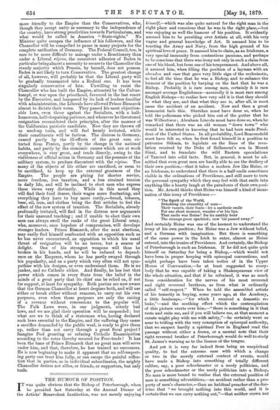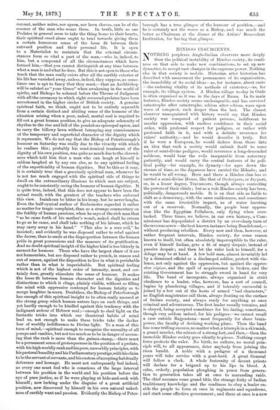THE HUMOUR OF POSITION.
IT wart quite obvious that the Bishop of Peterborough, when he presided last Saturday at the Annual Dinner of the Artists' Benevolent Institution, was not merely enjoying himeelf,—which was also quite natural for the right man in the
right place and conscious that he was in the right place,—but was enjoying as well the humour of his position. It evidently amused him to be presiding over Artists at all, with his very spiritual love of peace. It amused him to claim, as an Irishman, a very special immunity from contentious passions, and perhaps
to be conscious that there was irony not only in such a claim from one of his blood, but from one of his temperament. And above all, it amused him, when filling the position of a layman with an abandon and ease that gave very little sign of the ecclesiastic,
to feel all the time that he was a Bishop, and to enhance the humour of the position by harping on the fact that he was a Bishop. Probably it is rare among men, certainly it is rare amongst average Englishmen—assuredly it is most rare among English Bishops—to realise how very odd it is that they should be what they are, and that what they are is, after all, in most cases the accident of an accident. Now and then a great hnmourist feels this. Sheridan must have done so, when he told the policeman who picked him out of the gutter that he was Wilberforce ; Abraham Lincoln must have done so, when he remarked that there was an old woman " down town" who would be interested in knowing that he had been made Presi- dent of the United States. In all probability, Lord Beaconsfield. must have felt so, when he first found himself in a position to patronise Sidonia, to legislate on the lines of the reve- lation received by the Duke of Bellamont's son in Mount Sinai, and to translate the wild Eastern speculations of Tancred into solid facts. But, in general, it must be ad- mitted that even great men are hardly able to see the drollery of their own position,—that it takes a modern Jew like Heine, or an Irishman, to understand that there is a half-smile sometimes visible in the ordinations of Providence, and still more to turn the personal sympathy which they may feel with that smile into anything like a hearty laugh at the paradoxes of their own posi- tion. Mr. Arnold thinks that Heine was himself a kind of incar- nation of this irony of Providence :—
"The Spirit of the World, Beholding the absurdity of men—
Their vaunts, their feats—let a sardonic smile For one short moment, wander o'er his lips.
That smile was Heine! for its earthly hour
The strange guest sparkled; now 'tis passed away."
And certainly Heine was one of the keenest to understand the irony of his own position; for Heine was a Jew without belief, and a German with imagination. But there is something of the same power in the Irish to enter, almost as Heine entered, into the ironies of Providence. And certainly, the Bishop of Peterborough is such an Irishman. If he did not quite quiz himself on Saturday for being a Bishop,—which would not have been in proper keeping with episcopal conventions, and might perhaps have been taken notice of in the Upper House of Convocation,—he at least suggested to every-
body that he was capable of taking a Shakespearean view of the whole situation, and that if he refrained, it was as much from consideration for the nerves of his most reverend and right reverend brethren, as from what is ordinarily called " self-respect." When he told the assembled artists of his temerity in buying, some years ago, at the Academy, a little landscape,—" for which I received a domestic re- buke,"—and the soothing effect which the contemplation of this picture exerts over him,—" there is something in it that rests and suits me, and if you will believe me, at that moment a curate might play with me with safety,"—he certainly went so near to trifling with the very conception of episcopal authority, that we suspect hardly a spiritual Peer in England read the passage without either a frown, or a mental note that their right reverend brother of Peterborough would do well to study St. James's warning as to the licence of the tongue.
And yet it is very far indeed from being an unspiritual quality, to feel the extreme ease with which a change or two in the merely external context of events, would have made a Bishop into something of totally different calibre, say, a poor schoolmaster or a needy politician, and the poor schoolmaster or the needy politician into a Bishop. No man is more bound to realise that the external position of men is something adventitious,—an accident rather than a pro- perty of men's character,—than an habitual preacher of the doc- trine that "we brought nothing into this world, and it is certain that we can carry nothing out,"—that neither crown nor
coronet, neither mitre, nor apron, nor lawn sleeves, can be of the essence of the man who wears them. In truth, little as our Prelates in general seem to take the thing home to their hearts, their spiritual creed alone ought to tend towards giving them a certain humorous sense of the loose fit between their outward position and their personal life. It is open to a Materialist to maintain that the external circum- stances form so vital a part of the man,—who is, indeed, to him, but a compound of all the circumstances which have formed him,—that you cannot distinguish at any time between what a man is and what he does. But this is not open to those who teach that the man really exists after all the earthly exterior of his life has vanished away, unless, indeed, they suppose, as some- times one is apt to fancy that they must,—that an Archbishop will be saluted as" your Grace" when awakening in the world of spirits, and Bishops be ushered before the Throne of Judgment with all the ceremony to which right reverend prelates have been accustomed in the higher circles of British society. A genuine spiritual faith, we think, ought not to be entirely separable from a certain distinct and abiding sense of the humour of the situation arising when a poor, naked, mortal soul is required to fill out a great human position, to give an adequate solemnity of rhythm to the rise and fall of the pendulous episcopal apron, and to carry the billowy lawn without betraying any consciousness of the temporary and superficial character of the dignity which it represents. We do not say that the Bishop of Peterborough's humour on Saturday was really due to the vivacity with which he realises this ; probably his semi-ironical treatment of the dignity of his own position, was quite as much due to the shrewd- ness which told him that a man who can laugh at himself is seldom laughed at by any one else, as to any spiritual feeling of the superficiality of human dignities. But be this as it may, it is certainly true that a genuinely spiritual man, whenever he is not too much engaged with the spiritual side of things to dwell on the extraordinary illusions to which men are subject, ought to be constantly seeing the humour of human dignities. It is quite true, indeed, that this does not appear to have been the actual result, with the greatest of the teachers who enforced this view. Isaiah can be bitter in his irony, but he never laughs. Even the half-cynical author of Ecclesiastes regarded it rather as matter for tragic complaint, than as a strange commentary on the futility of human passions, when he says of the rich man that " as he came forth of his mother's womb, naked. shall he return to go as he came, and shall take nothing of his labour, which he may carry away in his hand." "This also is a sore evil," he insisted ; and evidently he was disposed rather to rebel against the decree, than to smile at the disproportion between the human pride in great possessions and the measure of its gratification. And no doubt spiritual insight of the higher kind is too bitterly in earnest for humour. Those who have the largest share of it are not hnbuour•ists, but are disposed rather to preach, in season and out of season, against the disposition to live in what is perishable rather than in what is imperishable. But spiritual feeling which is not of the highest order of intensity, must, and cer- tainly does, greatly stimulate the sense of humour. It makes the loose fit between human character and the dignities and distinctions to which it clings, plainly visible, without so filling the mind with oppressive contempt for human fatuity as to merge laughter in scorn. Doubtless, the Bishop of Peterborough has enough of this spiritual insight to be often really amused at the strong grasp which human nature lays on such things, and yet hardly enough to be kindled against this tendency with the indignant ardour of Hebrew zeal ;—enough to shed light on the fantastic tricks into which our theatrical habits of mind lead us, not enough to make these tricks take the darker hue of worldly indifference to Divine light. To a man of this turn of mind,—spiritual enough to recognise the unreality of all pomps and vanities, but not too much so to be in danger of assum- ing that the rank is more than the guinea-stamp,—there must be a permanent sense of grotesqueness in the position of a prelate, with his high worldly rank and his pure, unworldly principles, with his pastoral humility and his Parliamentary prestige,with his claim to be the servant of servants, and his custom of accepting habitually deference and homage. He must not unfrequently feel indeed, as every one must feel who is conscious of the large interval between his position in the world and his position before the eye of pure justice, as if he were playing at hide-and-seek with himself ; now lurking under the disguise of a great artificial position, now discovered by himself in his own natural naked- ness of earthly want and passion. Evidently the Bishop of Peter- borough has a true glimpse of the humour of position,—and he is certainly not the worse as a Bishop, and was much the better as Chairman at the dinner of the Artists' Benevolent Institution, for having that glimpse.



































 Previous page
Previous page